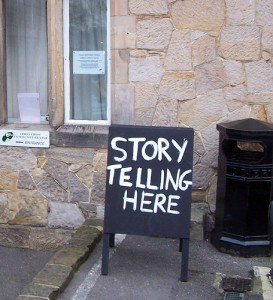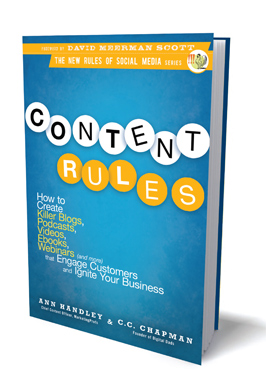What Does Storytelling Have to Do with Business?
Posted 15 years ago by Ann Handley | 12 Comments A few weeks ago I gave a presentation at ExactTarget’s user conference called Content Rules: What Stories, Blogs, Video & More Should Be Doing for You (and Your Clients).
A few weeks ago I gave a presentation at ExactTarget’s user conference called Content Rules: What Stories, Blogs, Video & More Should Be Doing for You (and Your Clients).
The upshot was how content (like stories, blogs, videos, and so on) should be a cornerstone of any brand’s marketing, and I talked to an audience for the first time about some of the concepts C.C. and I explore further in our book. (Which was cool, by the way.)
The following day, a panel of marketers representing companies of all stripes—from the long-established (Kodak) to the hip upstart (Threadless), and a few in between (Virgin America, Benchmark Brands) offered up their take on trends in marketing and business, like: What’s the role of a marketer in an organization? How have social media and technology altered the evolution of that role? And how do you get your customers (and would-be customers) to engage with your brand and the products you sell?
One of the major themes that emerged there was (surprise!)… Content! And specifically, what stories, blogs, video and more should be doing… Yeah. Like I said.
It was gratifying to hear some of the same themes I talked about the day before reinforced by the CMOs of some pretty smart companies. I’d like to think it was just because they all attended by presentation the previous day (ha!), but the truth is that producing great content is something so many companies are increasingly embracing; I loved the panel’s comments around the idea of “storytelling” as a cornerstone of what they’re doing to market online.
So what does storytelling have to do with business?
“Storytelling” is one of those works that I always find impossibly squishy in a business context. For me, it always conjures up more performance art than industry.
But the idea of storytelling as it applies to business isn’t about spinning a yarn or fairytale. Rather, it’s about how your business (or its products or services) exist in the real world: how people use your products—how they add value to people’s lives, ease their troubles, help shoulder their burdens, and meet their needs. Think in those terms when producing customer stories, case studies, or client narratives—so that people can relate to them. In that way, your content is not about “storytelling,” it’s about telling a true story well.
As the panel said: The job of marketers is to generate new ideas and pull compelling stories out of their organizations by figuring out what their audience is genuinely interested in seeing and reading or knowing about. Think about what you do, how to tell that story, and how to engage your customers through the stories you tell, said Jeffrey Hayzlett, author of The Mirror Test: Is Your Business Really Breathing? (Business Plus, 2010), who left his job as Kodak’s chief marketing officer in May.
That’s critical especially for business-to-business companies, which often sell intangible products or services that aren’t intrinsically interesting, but the way people use them are interesting. At Virgin America, for example, the hallmarks of what the brand is known for—leather seats, mood lighting on its aircraft—expresses the story, in part, of how the airline goes beyond the ordinary, added Porter Gale, vice-president of marketing at Virgin America.
In other words, find the stories of how your product lives in the world. And look to your customers for inspiration. “Have their story be your story,” said Cam Balzer, vice-president of marketing for Threadless a community-driven T-shirt and apparel company. Benchmark Brands incorporates customer stories of how its products help people into its marketing. If a shoe is meant to help someone with heel pain, “we don’t just state that fact, but we tell the story of someone for whom it made a difference,” says Trish Tobin, chief marketing officer, which sells over 2,500 styles of comfort, wellness and therapeutic footwear through its Footsmart brand.
Likewise, at Threadless, an artist receives $2,500 if his or her shirt is printed and sold in the Threadless store, and his or her inspiration for that design is woven into the site, and, more broadly, into the company’s brand. Tell the story of how your products came to be, or how your customers use them. Even if you’re making something less naturally prone to story than customer-designed T-shirts or therapeutic shoes, “your product can still be content,” Balzer says.
* * * * *
This is only a small bit of what the panel discussed (but it was the best part!)
You can read full coverage of the panel here, over at Amex’s OPEN Forum.
Tags: artsy-fartsy, business, content, content marketing, storytelling




October 3rd, 2010 at 4:35 pm
Great topic, Ann and one that I’m particularly interested in as it related to small business storytelling. Definitely agree that in the business context, story telling is really about “telling a true story well”. Also in business “numbers tell a story”. From a financial standpoint, there’s always a story behind the numbers. As an accounting professional, part of my job is to tell that story well.
October 3rd, 2010 at 12:56 pm
[…] The Business of Storytelling? Posted on October 3, 2010 by Online BeanCounter So you ask the question, “What does storytelling have to do with Business. Well, Ann Handley addresses this in her post. […]
October 3rd, 2010 at 8:50 pm
Could not agree more about the power of great story-telling in B2B marketing. People respond to great stories. Turn your product and services into stories like the companies did in this article.
But don’t take my word for the power of stories. Please watch the video at http://www.findnewcusotmers.com for an expert.
Jeff Ogden, the Fearless Competitor
Find New Customers “Lead Generation Made Simple”
October 3rd, 2010 at 11:48 pm
Thanks, Earl. And as I said over at your place… I absolutely love the title of your blog, “Storytelling Bean Counter.” Love to hear more about your business and what you do.
Thanks again —
October 7th, 2010 at 4:34 pm
Hi Ann, what a pleasure it was to officially meet you at the week’s HUG event in Boston. You were as kind in person as you were on the phone, and I’m very, very excited for your upcoming book. In fact, I can’t wait to write a blog post about it 😉
But your point in this article is so very valid and sadly often overlooked. Every product, and I really mean EVERY, has a story. And what’s crazy is that consumers actually like stories in conjunction with said products….nuts, huh? 😉
The message you share about the power of content, stories, videos, etc is one that, if embraced, will definitively catapult a business to the top of their field…if they but only DO…
Glad to be subscribed to your blog and again, thanks for your tremendous kindness Ann.
November 10th, 2010 at 10:20 am
[…] brilliant co-author wrote about this same topic recently so you can see I’m not alone in these […]
January 24th, 2011 at 12:33 am
[…] Content Rules :: What Does Business Have to Do With Storytelling? […]
May 13th, 2011 at 9:30 am
[…] the book. Can you talk about the way that “storytelling,” which is sometimes a squishy notion for businesses, can help smaller guys […]
August 5th, 2013 at 9:13 am
[…] Ann Handley – “it’s about how your business (or its products or services) exist in the real world: how people use your products—how they add value to people’s lives, ease their troubles, help shoulder their burdens, and meet their needs. Think in those terms when producing customer stories, case studies, or client narratives—so that people can relate to them. In that way, your content is not about “storytelling,” it’s about telling a true story well.” Source […]
November 25th, 2013 at 4:20 pm
[…] is not about “storytelling,” it’s about telling a true story well.” – Ann Handley, Content […]
March 12th, 2014 at 6:57 am
[…] Ann Handley – “it’s about how your business (or its products or services) exist in the real world: how people use your products—how they add value to people’s lives, ease their troubles, help shoulder their burdens, and meet their needs. Think in those terms when producing customer stories, case studies, or client narratives—so that people can relate to them. In that way, your content is not about “storytelling,” it’s about telling a true story well.” Source […]
January 29th, 2016 at 9:50 am
I read your article. I am totally agree with Jeff Ogden what he said in his comment. I am running my own business of Wide Shoes and I have another store too. But as he said, people respond to great stories and I am totally agree with him.